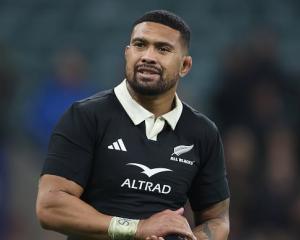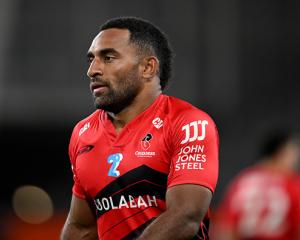ODT Online rugby writer Jeff Cheshire looks at some key points from Otago's match against Canterbury in Dunedin on Thursday night.
Kick and chase
There was an obvious tactic from Otago to not play too much rugby in their own half. Particularly in the first half, Hayden Parker, Nick Ealey and Trent Renata used the boot to clear the ball and force Canterbury to run it back. They did this with mixed results. Parker got good distance and was for the most part good, while Ealey also found space in behind a couple of times. Renata was looking to kick high on the counter and at times did so well, allowing for a contest, but at others kicked a bit deep and simply gave the ball away.
The strong chase was important too. Here you see value of having the likes of Marshall Suckling and Jayden Spence in your team. Both are players who will work hard and cut down the space of the opposition attackers. The defence pushed up well and was able to force Canterbury into making mistakes, allowing Otago to have all the ball for the first 20 minutes.
Tight game with ball in hand
It was clear from the opening stages that Otago were not going to shy away from what was a big, physical Canterbury team. They really took them on in the forwards, making use of forward runners off the ruck and a strong pick and go to gain metres and force Canterbury to make a lot of tackles.
The support play was good here too, as they ensured no one got too isolated and the support players remained close to the ball carrier to help protect the ball in the breakdown. Consequently, Canterbury had a hard time getting the ball off Otago and found themselves under pressure for most of the first half.
Scrambling defence
For a second game in a row, the Otago defence scrambled very well. It was no surprise that Canterbury were threatening when they found space. Otago got up fast and cut this space down well, but it was inevitable that there were going to be times where they were going to be forced to cramble. And they did so well. Up both wings they showed great desperation, with not only the outside backs, but a handful of forwards getting across to make the tackle and get in the passing lane to stop the offload. Charlie O'Connell, James Lentjes and Aki Seiuli were particularly good at this and prevented Canterbury getting the continuity that makes them so dangerous.
Golden-Oldies scrums did not hurt
The scrum was always going to be under pressure. It held up well while Donald Brighouse was on the tighthead side, but it certainly did not hurt Otago's chances to be able to go to non-contestable scrums. From this, Otago were able to know that they were guaranteed the ball on their own put-in and were able to avoid any scrum penalties. Also, was it not so much better watching a game that did not have constant scrum problems?
Lineout still a problem
The lineout was the main issue, as it has been all season. There was a combination of factors contributing to this. Sam Anderson-Heather, normally a solid thrower, struggled, at times over-throwing the ball. However, this could perhaps be attributed to the good Canterbury lineout. They get high and perhaps Anderson-Heather felt it necessary to throw a bit higher to get it over the contesting jumpers. Likewise, the Otago jumpers at times were not flash either, losing the ball forward and were guilty of unawareness twice on Canterbury's throws.
Different players
We saw some different players get a run in this game and many of them impressed. Nick Ealey was good and showed that he should be the starting halfback. His ball delivery is quicker than that of Josh Renton, possessing a nice pass and passing off the ground. While Renton is undoubtedly a top prospect, he needs to stop taking the extra step before he passes to become a genuine option at this level.
Along with Ealey, Marshall Suckling reminded us why he was touted so highly two years ago. He is not the sort of player who will light the game up, but works hard and is very strong defensively. Jayden Spence moved into centre and was the most lively of the backs, changing direction well and taking the ball to the line hard. His ability to play both centre and wing is a huge plus, as it gives the coaches options when it comes to selections or if there is an injury.
In the forwards Sam Anderson-Heather was highly involved and had a good game other than his throwing. Likewise, Liam Coltman had a very strong game and seemed better for not having to worry about throwing the ball into the lineout.
Got to be happy with a bonus point
This might be seen as a defeatist attitude and it is certainly meant as no disrespect towards the Otago players. But this Canterbury team is a good team. They are big, they are skilful and they are clinical. For the past six years they have been the best team in this competition and look to be head and shoulders above the rest this year again too. They are a team of Super Rugby players, with a handful of up-and-comers and a few All Blacks sprinkled amongst them.
In general, this Otago team is a group of good club players, at the moment. They have not got too many established players at the provincial level, with the majority only really finding their feet at this level in the past year or so. To be able to compete so well with such a strong team is a huge positive and has to be encouraging for such a young team. Give them a few years and who knows where they will be. For now, staying within seven points of Canterbury is a good effort.













